The Wholesome Journey - Group Nutrition Coaching Program
Mentorship Program, 1:1 Nutrition Coaching with Alison
What do you want to learn more about?
Program Login
Podcast Features
February 27, 2020
Alison Tierney, MS, RD, CD, CSO
Alison is a registered dietitian, board-certified in oncology nutrition, and a cancer thriver. Her expertise in oncology nutrition and personal experience with her own cancer diagnosis and its treatment provide her with the unique perspective of being able to relate to her clients on an entirely different level. Her content is consistently focused on evidence-based guidelines and seeks to increase the awareness of the power of nutrition to complement traditional cancer therapies.
- Alison Tierney, MS, RD, CD, CSO
- Alison Tierney, MS, RD, CD, CSO
- Alison Tierney, MS, RD, CD, CSO
- Alison Tierney, MS, RD, CD, CSO
- Alison Tierney, MS, RD, CD, CSO
- Alison Tierney, MS, RD, CD, CSO
- Alison Tierney, MS, RD, CD, CSO
- Alison Tierney, MS, RD, CD, CSO
- Alison Tierney, MS, RD, CD, CSO
- Alison Tierney, MS, RD, CD, CSO
- Alison Tierney, MS, RD, CD, CSO
- Alison Tierney, MS, RD, CD, CSO
- Alison Tierney, MS, RD, CD, CSO
- Alison Tierney, MS, RD, CD, CSO
- Alison Tierney, MS, RD, CD, CSO
- Alison Tierney, MS, RD, CD, CSO
- Alison Tierney, MS, RD, CD, CSO
- Alison Tierney, MS, RD, CD, CSO
- Alison Tierney, MS, RD, CD, CSO
- Alison Tierney, MS, RD, CD, CSO
- Alison Tierney, MS, RD, CD, CSO
- Alison Tierney, MS, RD, CD, CSO
- Alison Tierney, MS, RD, CD, CSO
- Alison Tierney, MS, RD, CD, CSO
- Alison Tierney, MS, RD, CD, CSO
- Alison Tierney, MS, RD, CD, CSO
- Alison Tierney, MS, RD, CD, CSO
- Alison Tierney, MS, RD, CD, CSO
- Alison Tierney, MS, RD, CD, CSO
- Alison Tierney, MS, RD, CD, CSO
- Alison Tierney, MS, RD, CD, CSO
- Alison Tierney, MS, RD, CD, CSO
- Alison Tierney, MS, RD, CD, CSO
- Alison Tierney, MS, RD, CD, CSO
- Alison Tierney, MS, RD, CD, CSO
- Alison Tierney, MS, RD, CD, CSO
- Alison Tierney, MS, RD, CD, CSO
- Alison Tierney, MS, RD, CD, CSO
- Alison Tierney, MS, RD, CD, CSO
- Alison Tierney, MS, RD, CD, CSO
- Alison Tierney, MS, RD, CD, CSO
- Alison Tierney, MS, RD, CD, CSO
- Alison Tierney, MS, RD, CD, CSO
- Alison Tierney, MS, RD, CD, CSO
- Alison Tierney, MS, RD, CD, CSO
- Alison Tierney, MS, RD, CD, CSO
- Alison Tierney, MS, RD, CD, CSO
- Alison Tierney, MS, RD, CD, CSO
- Alison Tierney, MS, RD, CD, CSO
- Alison Tierney, MS, RD, CD, CSO
- Alison Tierney, MS, RD, CD, CSO
- Alison Tierney, MS, RD, CD, CSO
- Alison Tierney, MS, RD, CD, CSO
- Alison Tierney, MS, RD, CD, CSO
- Alison Tierney, MS, RD, CD, CSO
- Alison Tierney, MS, RD, CD, CSO
- Alison Tierney, MS, RD, CD, CSO
- Alison Tierney, MS, RD, CD, CSO
- Alison Tierney, MS, RD, CD, CSO
- Alison Tierney, MS, RD, CD, CSO
- Alison Tierney, MS, RD, CD, CSO
- Alison Tierney, MS, RD, CD, CSO
- Alison Tierney, MS, RD, CD, CSO
- Alison Tierney, MS, RD, CD, CSO
- Alison Tierney, MS, RD, CD, CSO
- Alison Tierney, MS, RD, CD, CSO
- Alison Tierney, MS, RD, CD, CSO
- Alison Tierney, MS, RD, CD, CSO
- Alison Tierney, MS, RD, CD, CSO
- Alison Tierney, MS, RD, CD, CSO
- Alison Tierney, MS, RD, CD, CSO
- Alison Tierney, MS, RD, CD, CSO
- Alison Tierney, MS, RD, CD, CSO
- Alison Tierney, MS, RD, CD, CSO
- Alison Tierney, MS, RD, CD, CSO
- Alison Tierney, MS, RD, CD, CSO
- Alison Tierney, MS, RD, CD, CSO
- Alison Tierney, MS, RD, CD, CSO
- Alison Tierney, MS, RD, CD, CSO
- Alison Tierney, MS, RD, CD, CSO
- Alison Tierney, MS, RD, CD, CSO
- Alison Tierney, MS, RD, CD, CSO
- Alison Tierney, MS, RD, CD, CSO
- Alison Tierney, MS, RD, CD, CSO
- Alison Tierney, MS, RD, CD, CSO
- Alison Tierney, MS, RD, CD, CSO
- Alison Tierney, MS, RD, CD, CSO
- Alison Tierney, MS, RD, CD, CSO
- Alison Tierney, MS, RD, CD, CSO
- Alison Tierney, MS, RD, CD, CSO
- Alison Tierney, MS, RD, CD, CSO
- Alison Tierney, MS, RD, CD, CSO
- Alison Tierney, MS, RD, CD, CSO
- Alison Tierney, MS, RD, CD, CSO
- Alison Tierney, MS, RD, CD, CSO
- Alison Tierney, MS, RD, CD, CSO
- Alison Tierney, MS, RD, CD, CSO
- Alison Tierney, MS, RD, CD, CSO
- Alison Tierney, MS, RD, CD, CSO
- Alison Tierney, MS, RD, CD, CSO
- Alison Tierney, MS, RD, CD, CSO
- Alison Tierney, MS, RD, CD, CSO
- Alison Tierney, MS, RD, CD, CSO
- Alison Tierney, MS, RD, CD, CSO
- Alison Tierney, MS, RD, CD, CSO
- Alison Tierney, MS, RD, CD, CSO
- Alison Tierney, MS, RD, CD, CSO
- Alison Tierney, MS, RD, CD, CSO
- Alison Tierney, MS, RD, CD, CSO
- Alison Tierney, MS, RD, CD, CSO
- Alison Tierney, MS, RD, CD, CSO
- Alison Tierney, MS, RD, CD, CSO
- Alison Tierney, MS, RD, CD, CSO
- Alison Tierney, MS, RD, CD, CSO
- Alison Tierney, MS, RD, CD, CSO
- Alison Tierney, MS, RD, CD, CSO
- Alison Tierney, MS, RD, CD, CSO
- Alison Tierney, MS, RD, CD, CSO
- Alison Tierney, MS, RD, CD, CSO
- Alison Tierney, MS, RD, CD, CSO
- Alison Tierney, MS, RD, CD, CSO
- Alison Tierney, MS, RD, CD, CSO
- Alison Tierney, MS, RD, CD, CSO
Organic vs. Conventional Foods – Which are Safer?
The debate between organically and conventionally grown continues.
In my previous post, I reviewed the research regarding organic foods and their potential health benefits in comparison to conventionally grown foods.
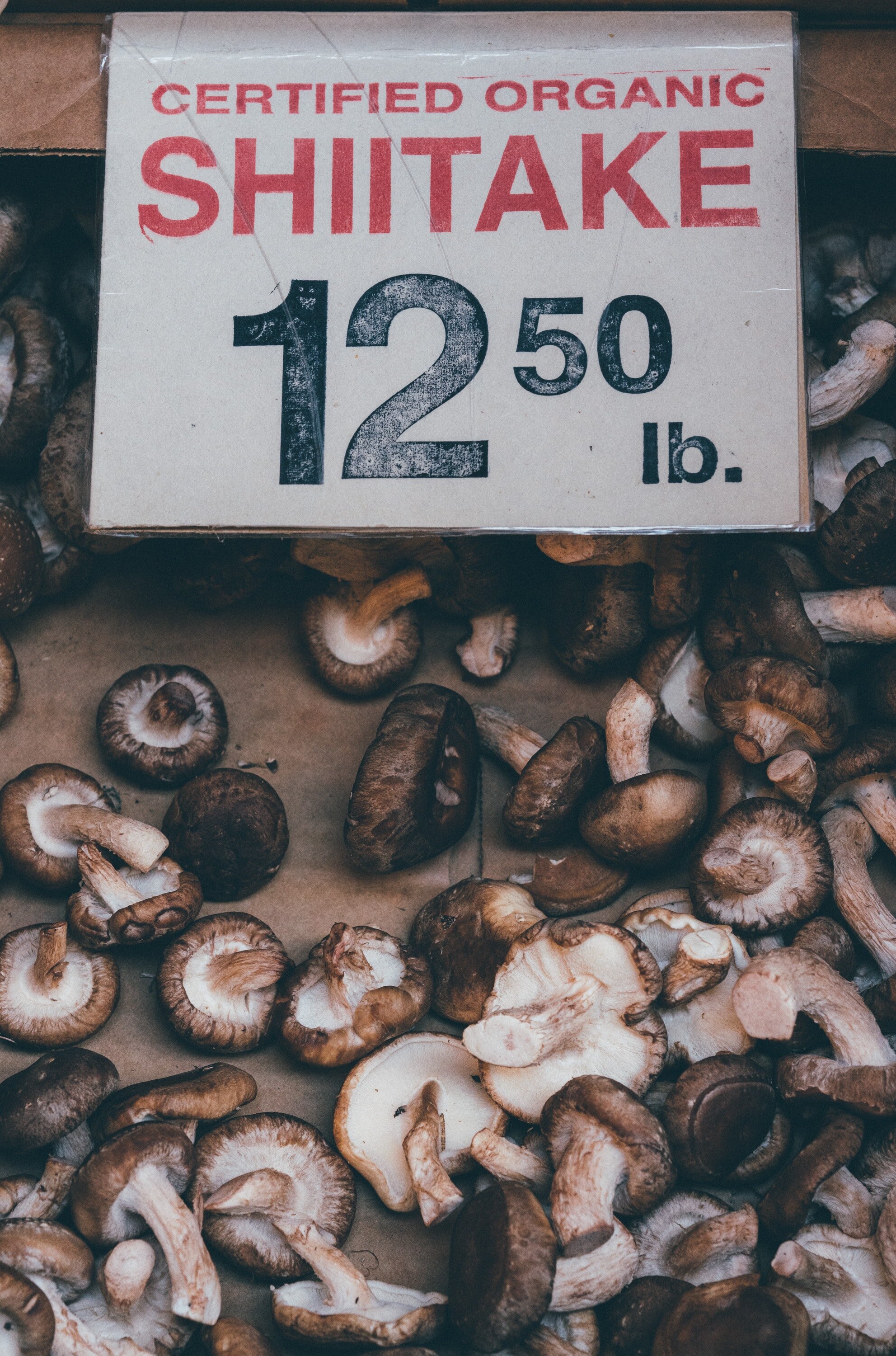
Today, I want to focus on the safety aspect of organic foods. This topic doesn’t come without controversy and differences in opinion.
Several individuals close within my circle have different viewpoints and beliefs on this topic. And that’s okay. Here at Wholesome, we respect all individual opinions, especially because we can learn something from each viewpoint even if we don’t entirely agree.
An opinion free of all bias is impossible. However, we strive to remove as much bias as possible. How do we do that?
We aim to present the facts — pure, evidence-based facts. Preferably, the research is not performed by a group who has financial interest in either conventional or organically grown foods. Third-party research is ideal. But again, complete freedom from bias is hard to come by.
Let’s dive into the facts.
When individuals were surveyed why they choose organic foods, the most common answer was related to safety. (1) Specifically, those who were concerned about safety contemplated the following issues when it came to their foods:
- Multidrug bacteria resistance
- Food poisoning risk
- Pesticide residue
Let’s break down each of these concerns.
Multidrug Bacteria Resistance
Multidrug bacteria resistance is when bacteria becomes resistant to more than one antibiotic. Unfortunately, this issue is becoming more common and poses a threat to our health. Why? Infections with resistant bacteria are more difficult to treat and tend to have higher death rates.
So, do organic foods tend to have less multidrug bacteria resistance issues?
Let’s see what the research says. When looking at chicken and pork, research indicates there is a higher risk for contamination of multidrug resistance bacteria in conventionally grown chicken and pork compared to organically grown.
The downside of this research? It has only been properly conducted in meat since antibiotic use in animals is a more regular practice (to help prevent infection of the animals). (2)
Food Poisoning Risk
Unfortunately, we see food poisoning frequently. There seems to be food recalls due to E. coli, salmonella, and campylobacter contamination on a regular basis. As many know, in some situations these issues can be life threatening.
However, research demonstrates there is no difference in risk in bacteria (specifically, salmonella and campylobacter) contamination among organic versus conventional products. (2)
Pesticide Exposure
From my experience, pesticide exposure is the most common concern of organic foods.
Much of the research related to the risk of pesticide exposure has been done on individuals who live or work around pesticides. Heartbreakingly so, there is a large body of evidence demonstrating this level of exposure to pesticides increases the risk of several chronic diseases, such as: (3)
- Several cancers
- Neurodegenerative diseases (e.g. Parkinson’s, Alzheimer’s, ALS, etc.)
- Birth defects
- Reproductive disorders
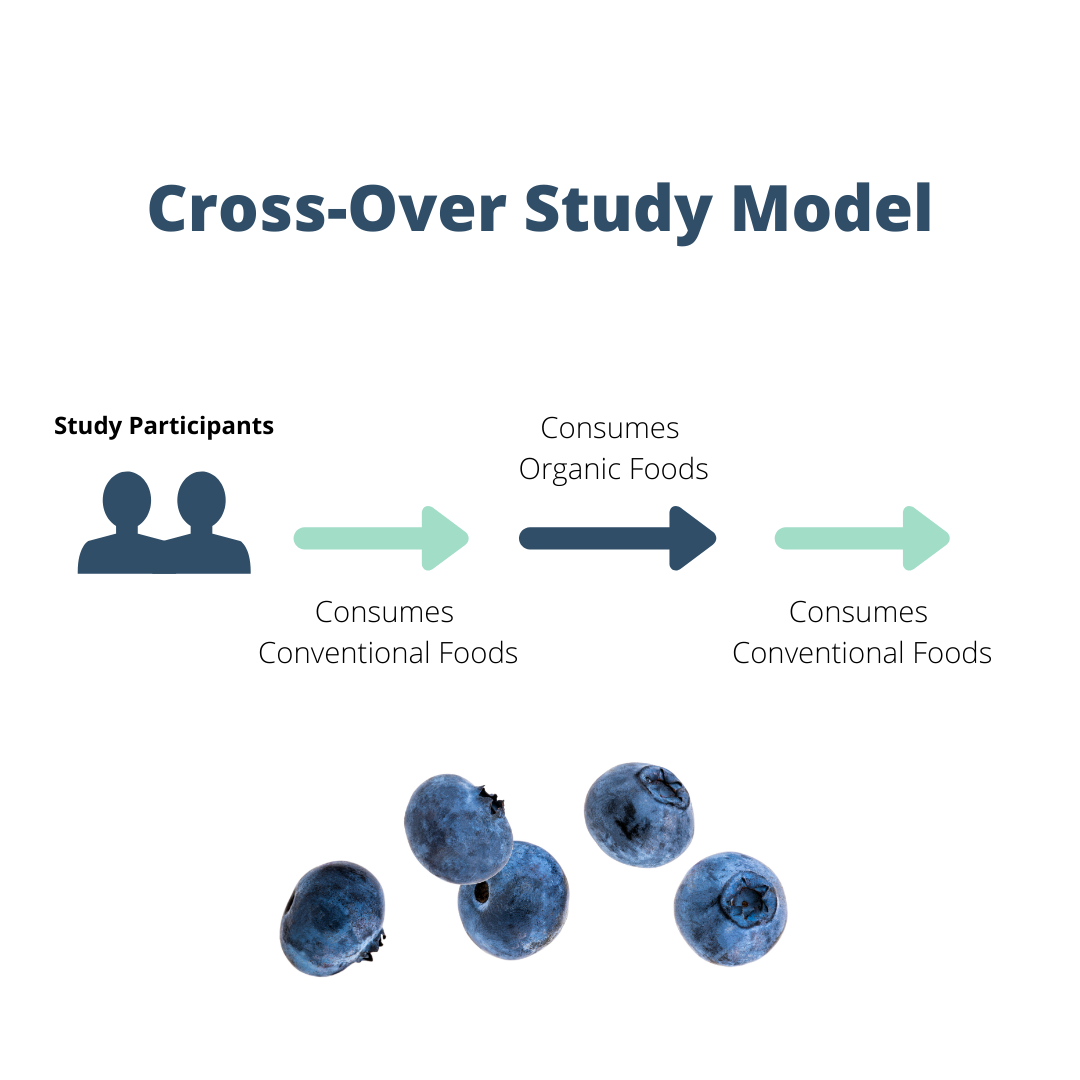
While all of us are not consistently exposed to this level of pesticide exposure, it is important to consider whether or not pesticide residue on the foods we consume increase our risk of disease.
The truth is, we don’t really know yet.
At this point in time, the best research we have comes from crossover studies. This is when individuals within the study are exposed (or receive) both treatments. In this case, whether the individuals consumed organic foods or conventional foods. Therefore, individuals consumed conventional foods for a period of time, then switched to organic foods, and back to conventional foods. The researchers then looked at the pesticides within the urine.
This particular study, done in children, showed a significant and dramatic effect of consuming organic foods versus conventional.
Figure 1 demonstrates the amount of MDA (malathion dicarboxylic acid – a type of organophosphorus pesticide) found in the children’s urine. You can see the reduction in exposure when the children were eating an organic diet.
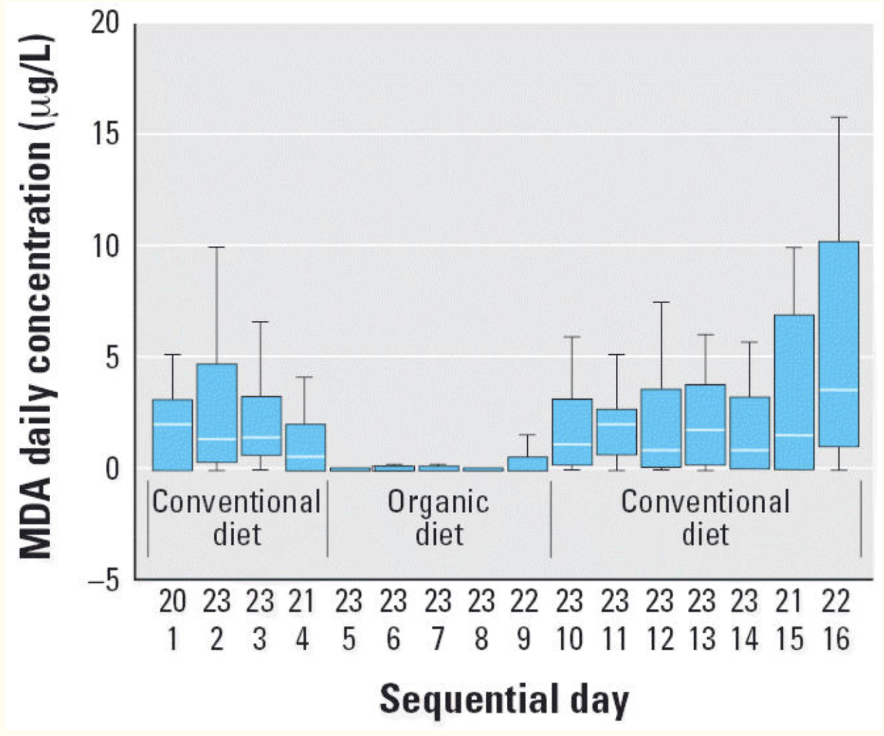
Figure 2, as you can see, shows similar results looking at TCPY (3,5,6-trichloro-2-pyridinol – a type of organophosphorus pesticide).
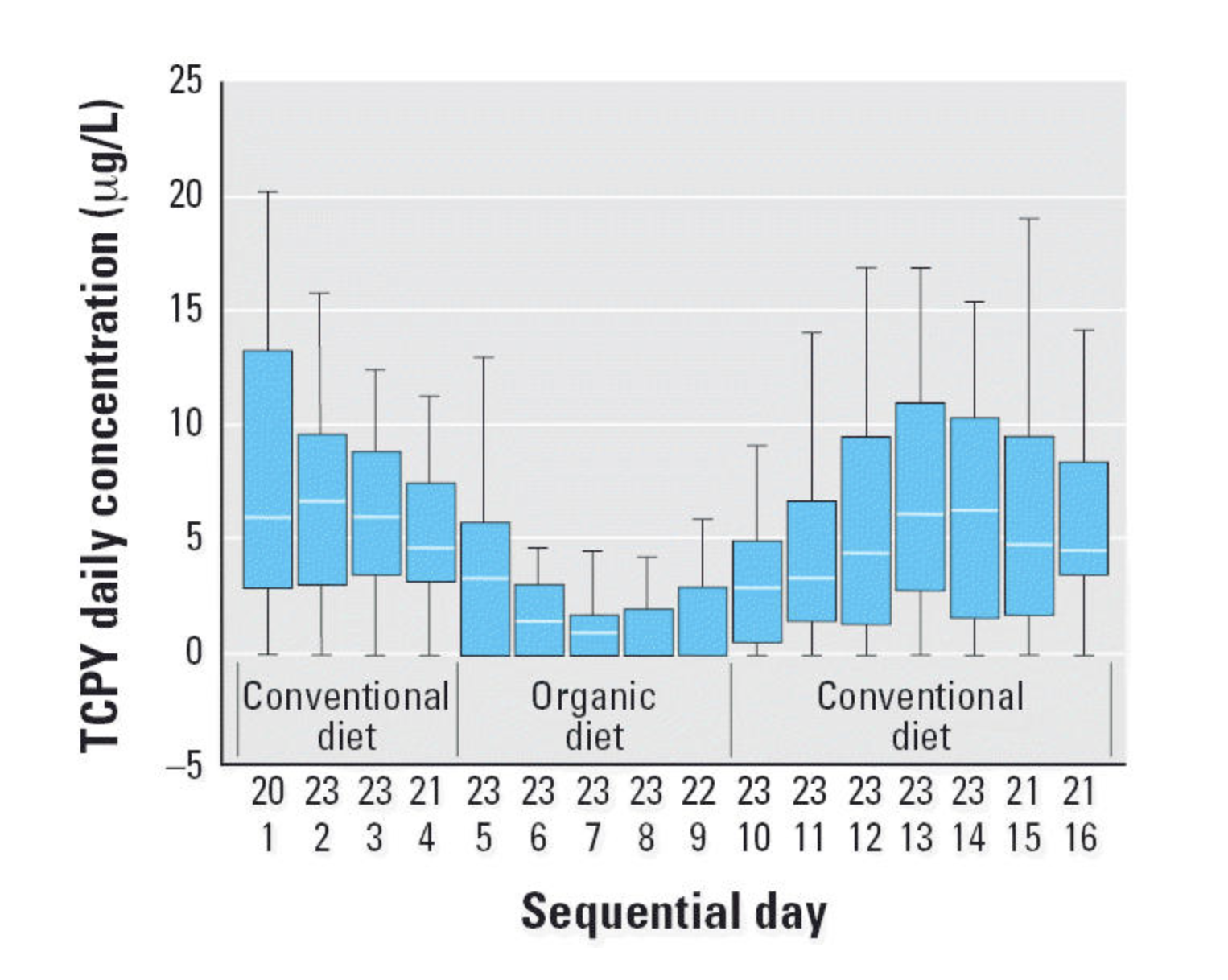
There are a couple items to note with this.
- Notice that when eating organic food, the exposure was not zero, but less. Consuming organic foods does not mean no pesticides, but generally does mean less.
- These studies do not conclude whether the exposure to pesticides through food consumption increases the risk of chronic diseases.
What Does this All Mean?
We need more research.
We need more large scale, long term studies. But, these studies are tough to do. Just like many nutrition studies there are endless confounding (or influencing) variables. On top of organic or conventional foods, does the individual smoke? Exercise? Eat legumes? Although there are different statistical models that can account for these, the research is still more difficult
As always, we believe it is important for you to make the choice you feel most comfortable with for you and your family.
Many choose to operate under the precautionary principle. Defined as:
“The precautionary principle is a strategy for approaching issues of potential harm when extensive scientific knowledge on the matter is lacking. It emphasizes caution, pausing and review before leaping into new innovations that may prove disastrous.”
In this case, and several nutrition related subjects, extensive scientific knowledge is lacking so you need to approach the issue with your own caution.
As always, the choice is yours.
Here at Wholesome, we simply encourage you to eat more plants — whether they are organic or conventional.
- M K Magnusson, A Arvola, U K Hursti, L Aberg, P O Sjoden. Choice of organic foods is related to perceived consequences for human health and to environmentally friendly behaviour. Appetite. 2003 Apr;40(2):109-17.
- C Smith-Spangler, M L Brandeau, G E Hunter, J C Bavinger, M Pearson, P J Eschbach, V Sundaram, H Liu, P Schirmer, C Stave, I Olkin, D M Bravata. Are organic foods safer or healthier than conventional alternatives?: a systematic review. Ann Intern Med. 2012 Sep 4;157(5):348-66.
- S Mostafalou, M Abdollahi. Pesticides and human chronic diseases: evidences, mechanisms, and perspectives. Toxicol Appl Pharmacol. 2013 Apr 15;268(2):157-77.
Are Organic Foods Safer than Conventional Foods?
Leave a Reply Cancel reply
Featured Articles
Wholesome LLC is not a medical practice, and its employees cannot offer medical advice. This website provides educational information but it is not a substitute for medical advice from a licensed medical professional who is familiar with your particular facts and circumstances. The information contained on this website is not intended to diagnose, treat, or cure any disease and shall not be construed as medical advice. The information and education on this website is provided for you to use at your own discretion.
You can further review our disclaimer here.
Wholesome
About Alison
Courses & Programs
The Wholesome Journey
Free Resources
FAQs
Press & Media
Recipes
Blog
Contact Us
Shop
© 2026 Wholesome, LLC All rights reserved.
Privacy Policy
Terms of Use
Disclaimer
Mobile Terms of Service
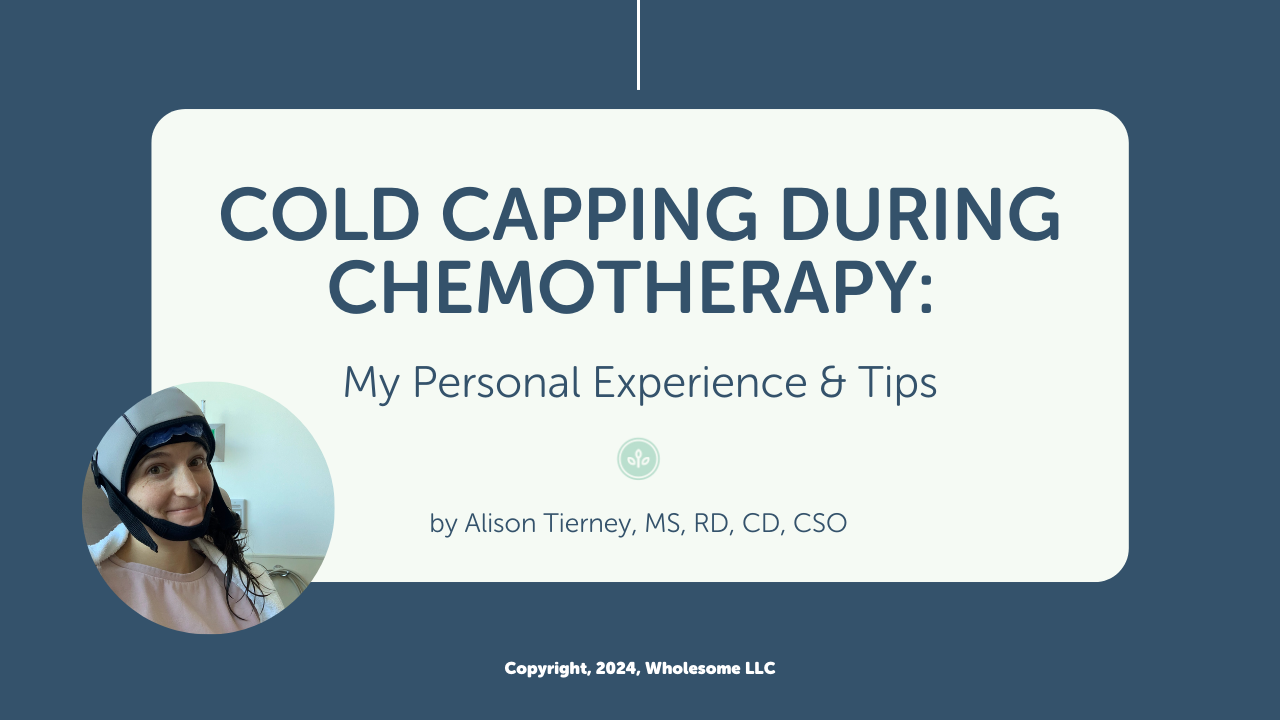


Be the first to comment